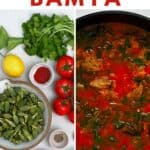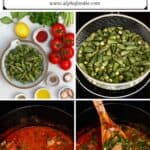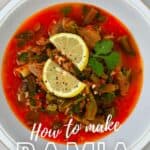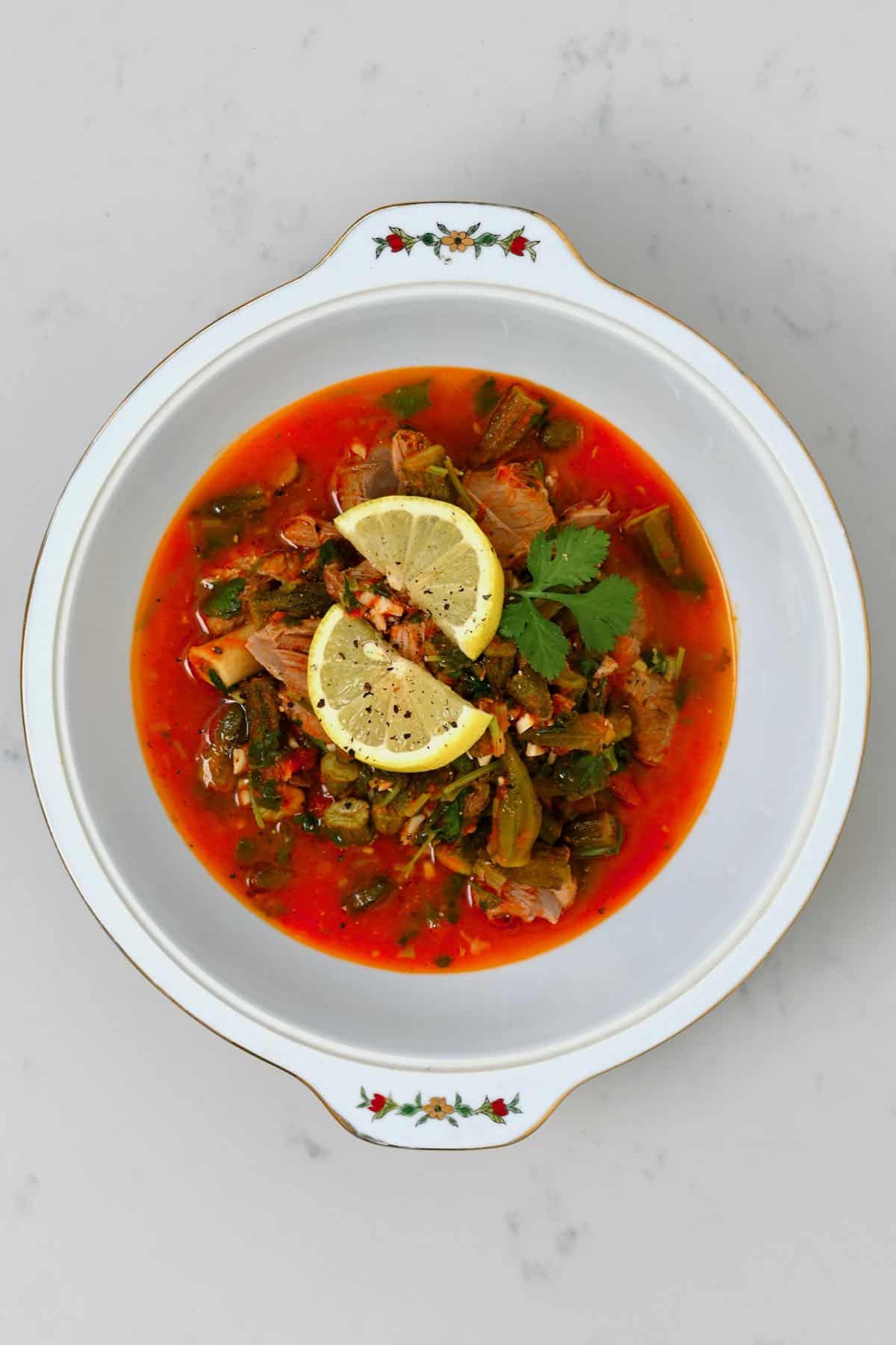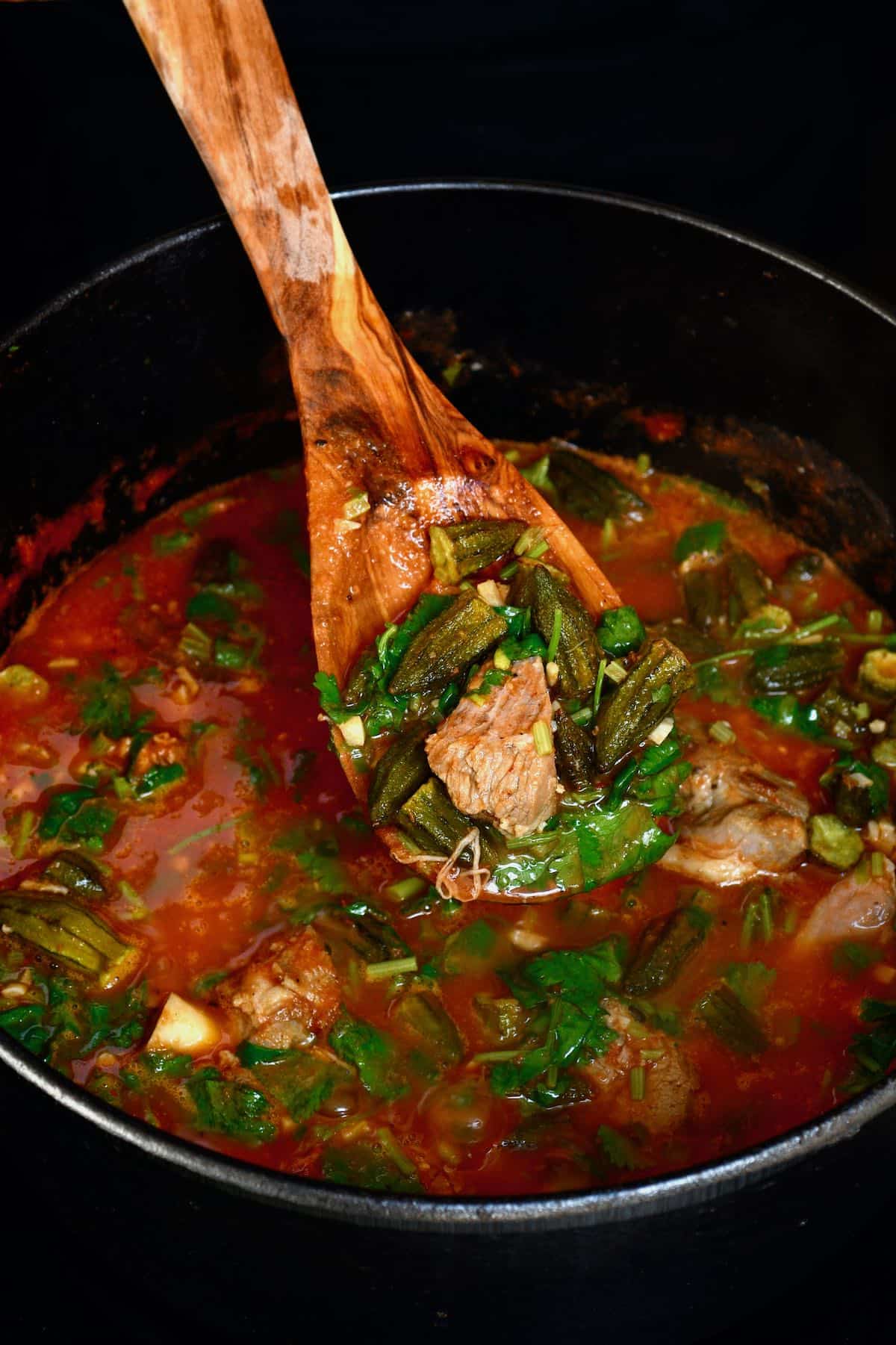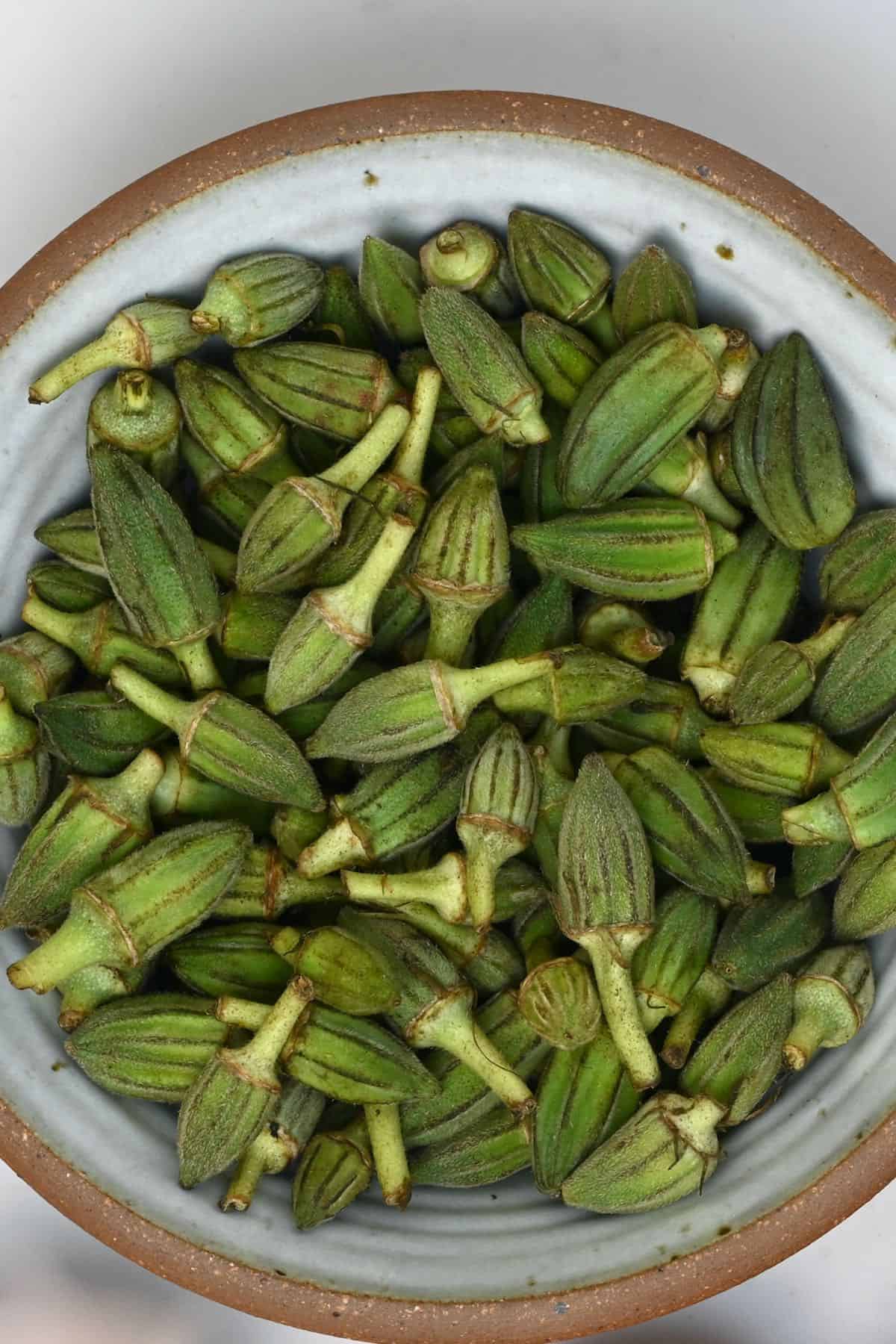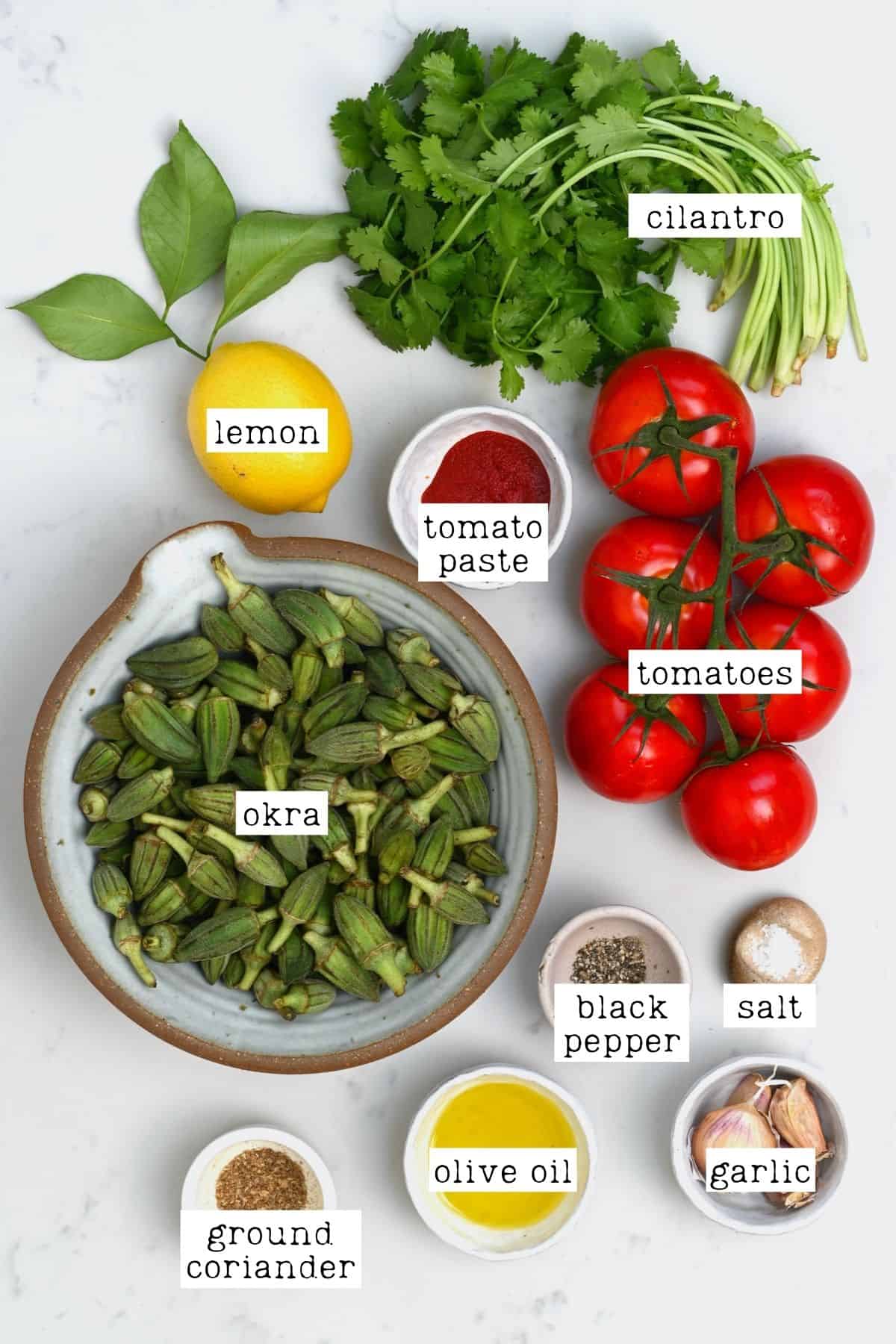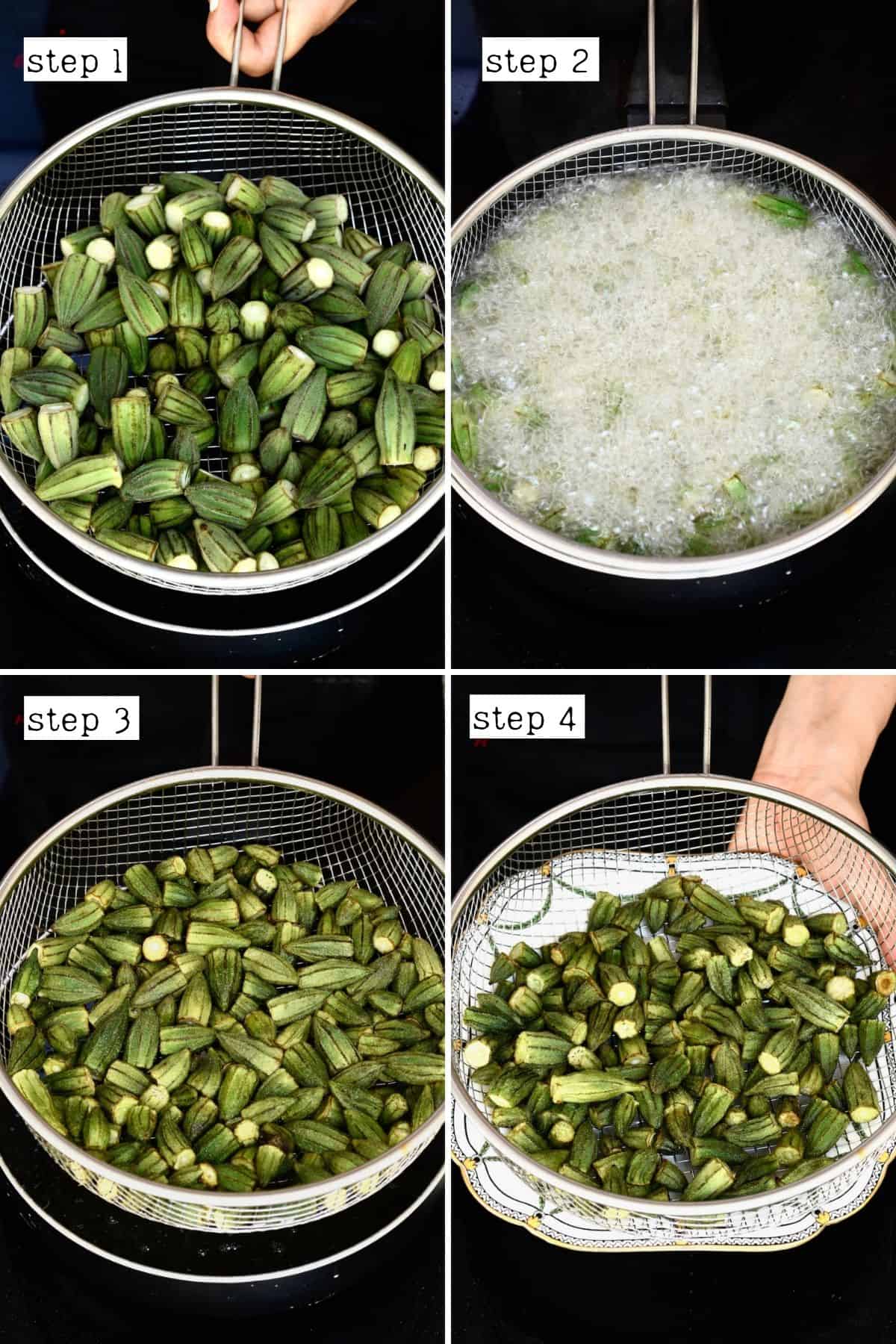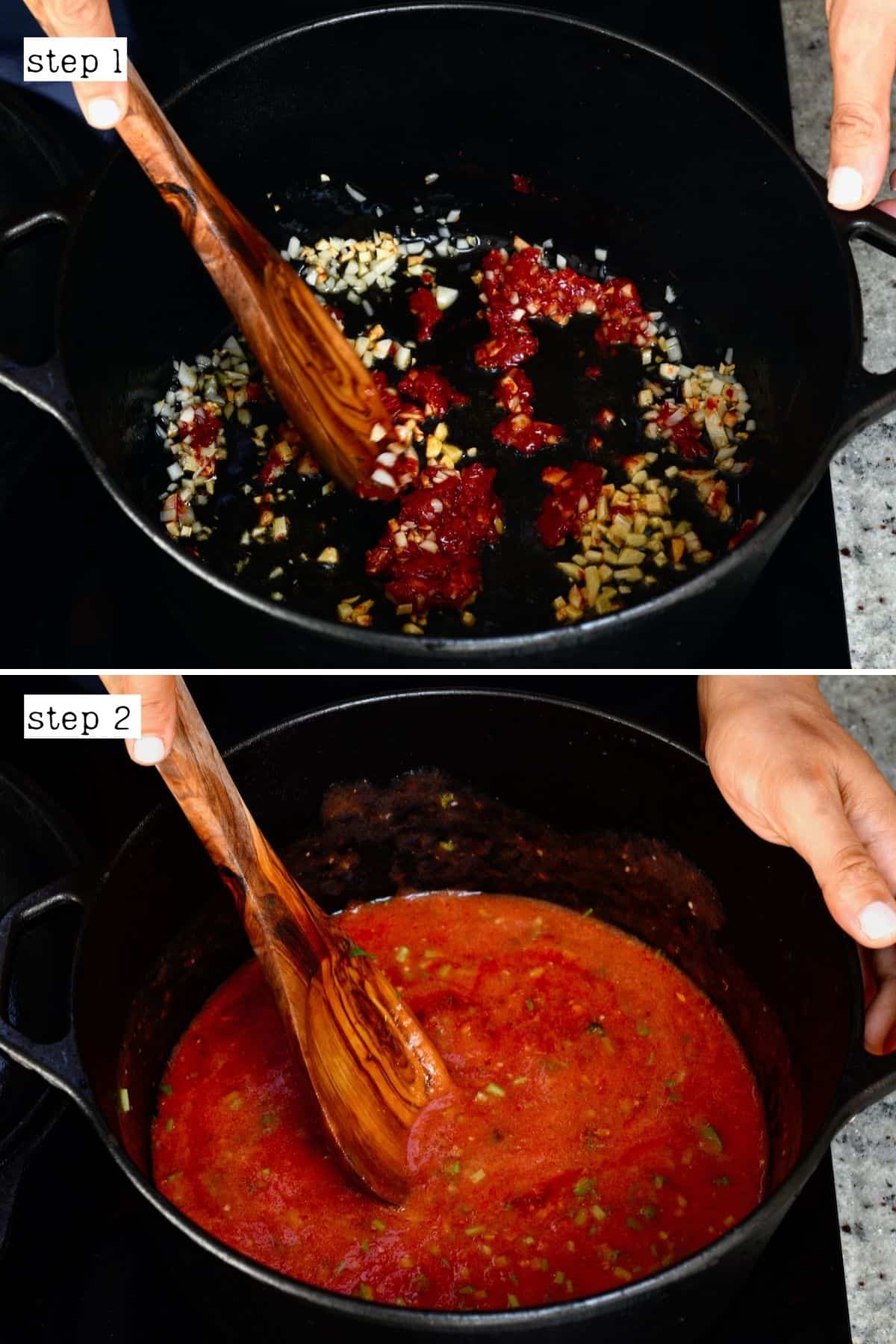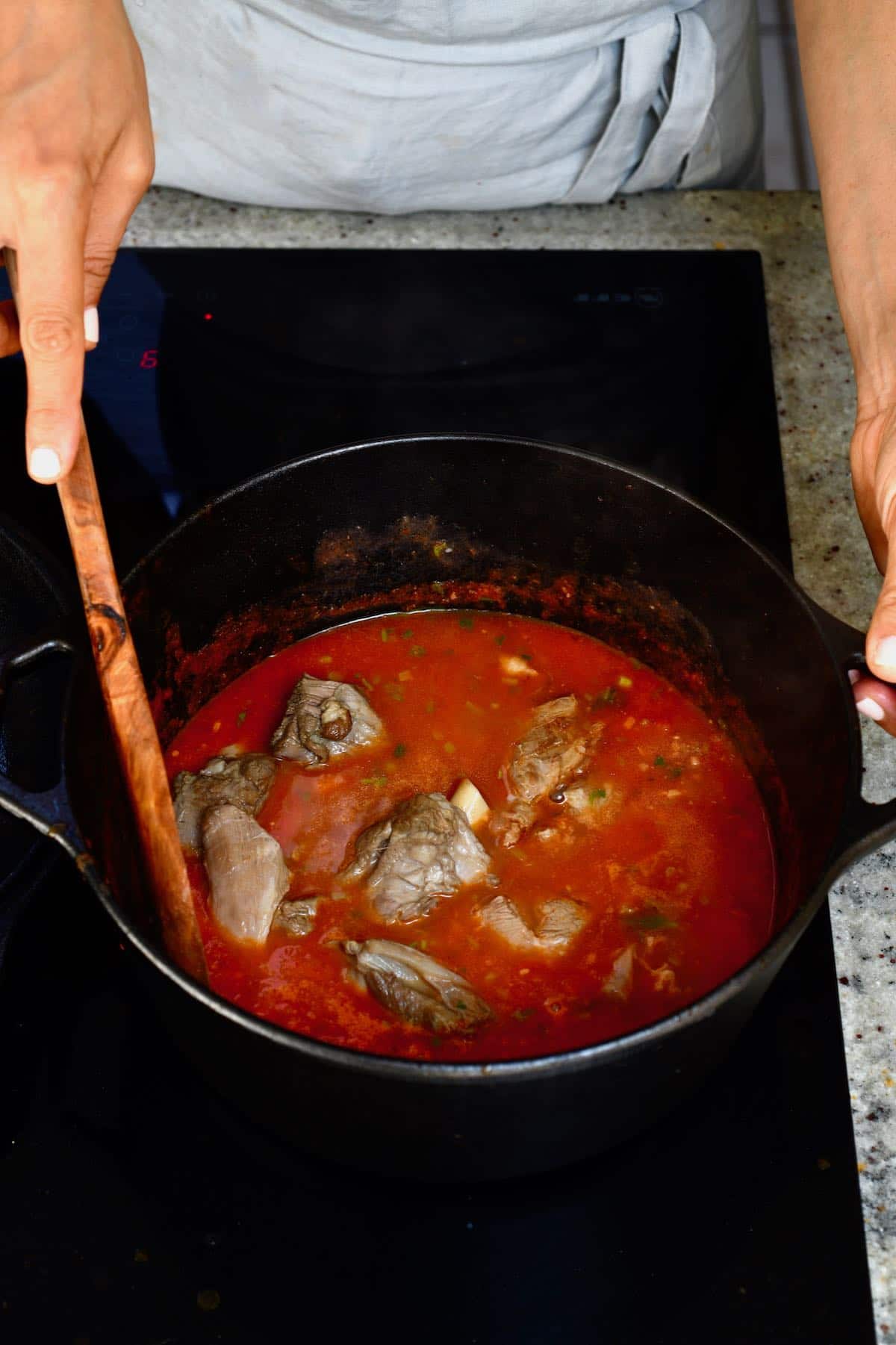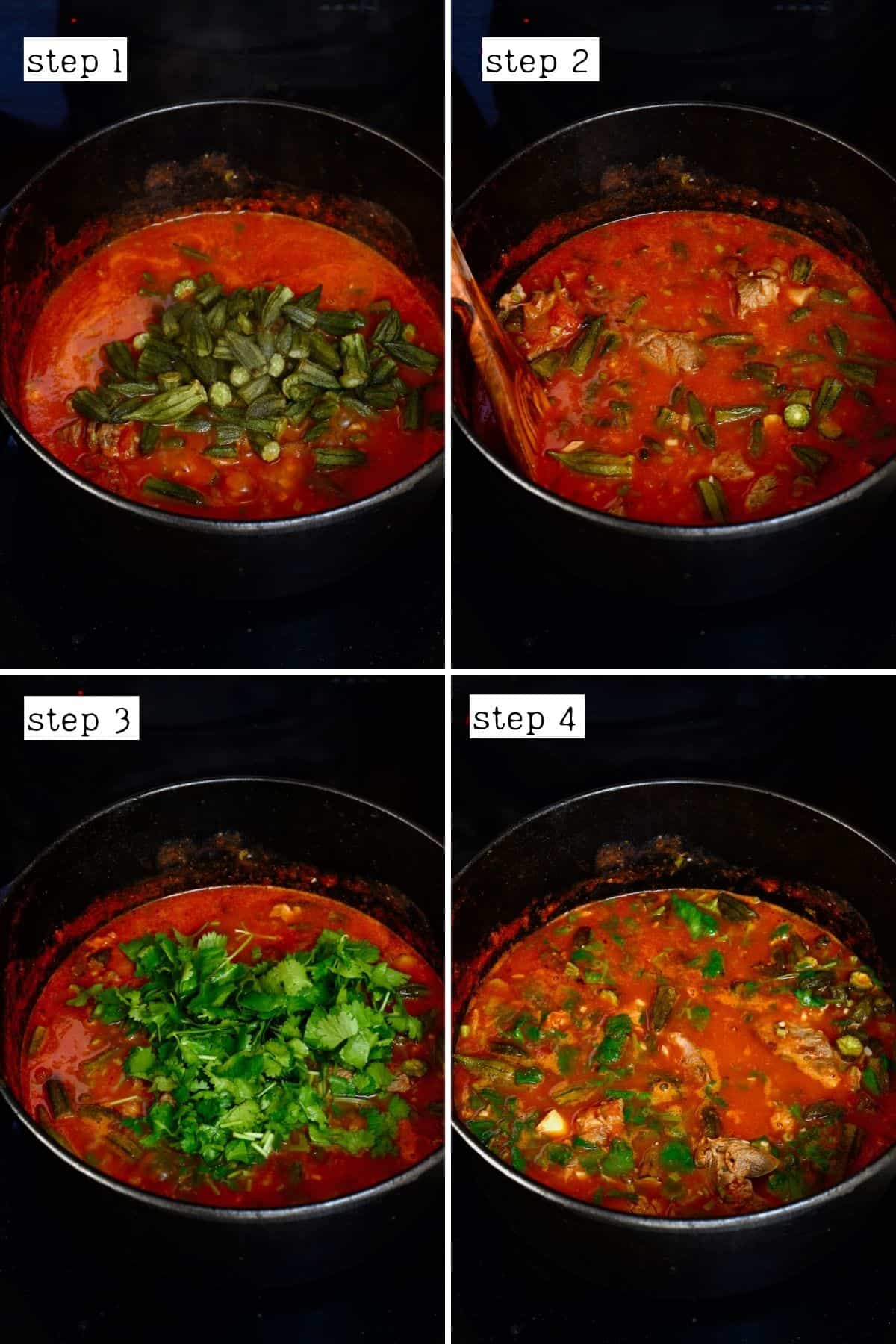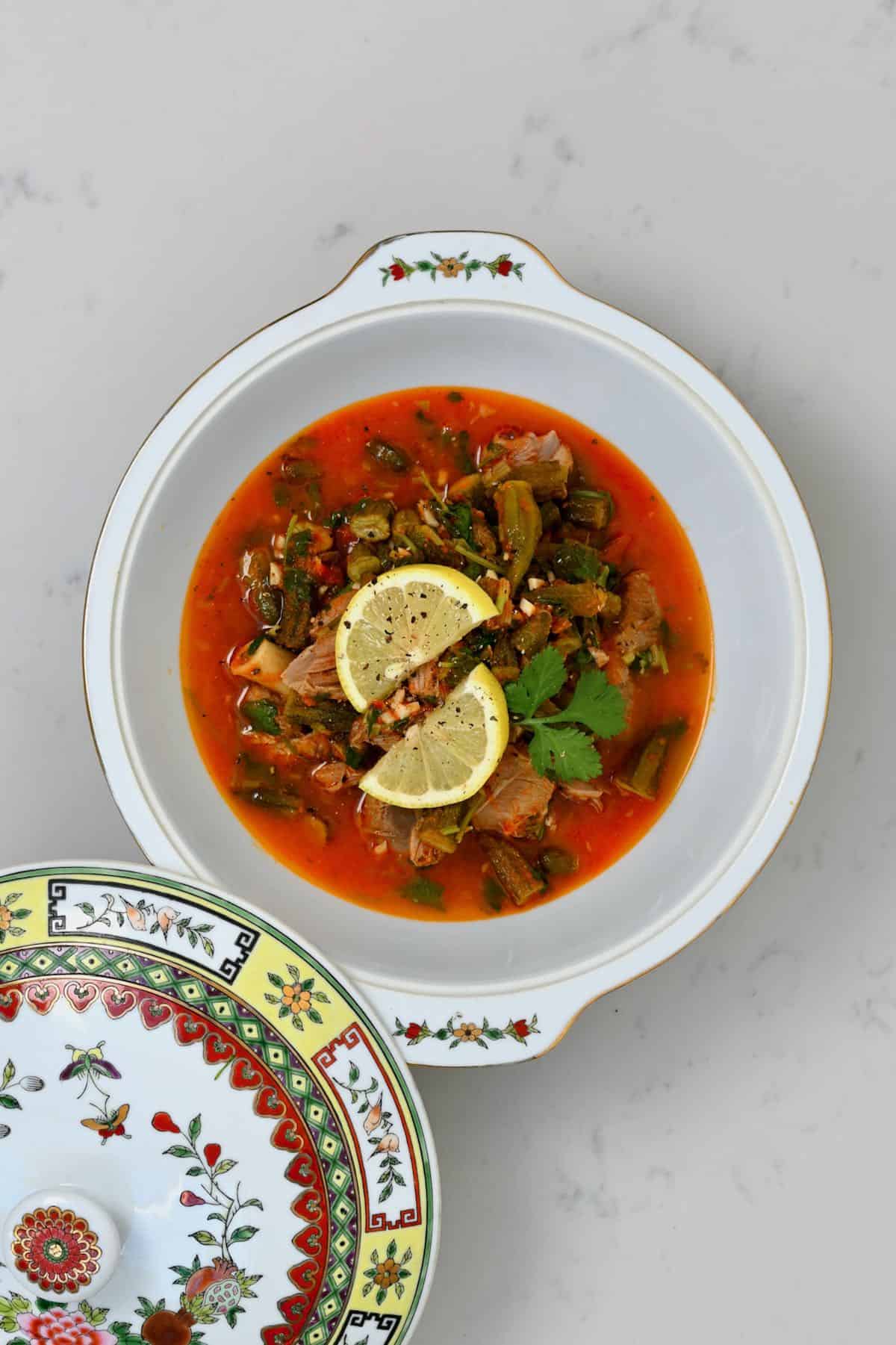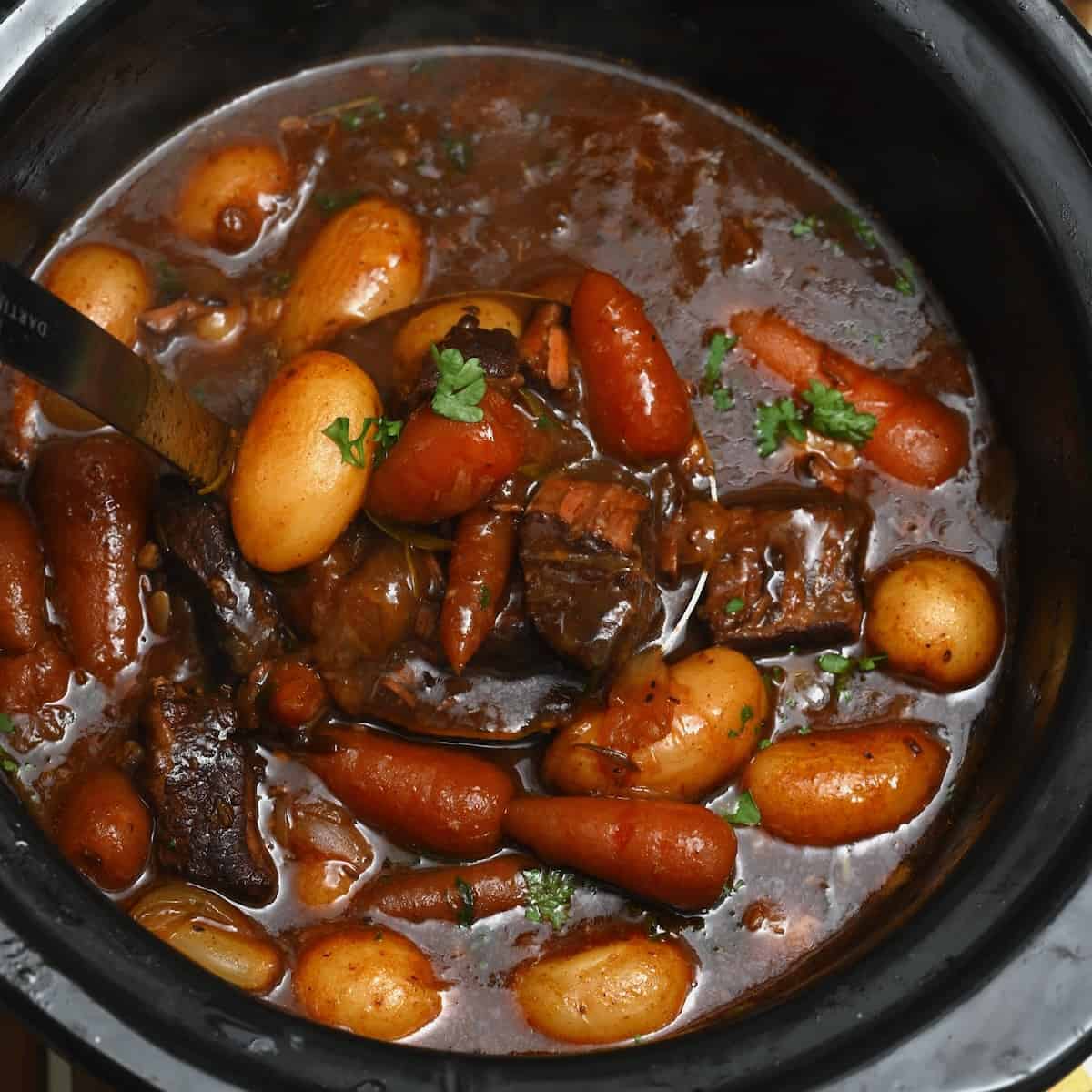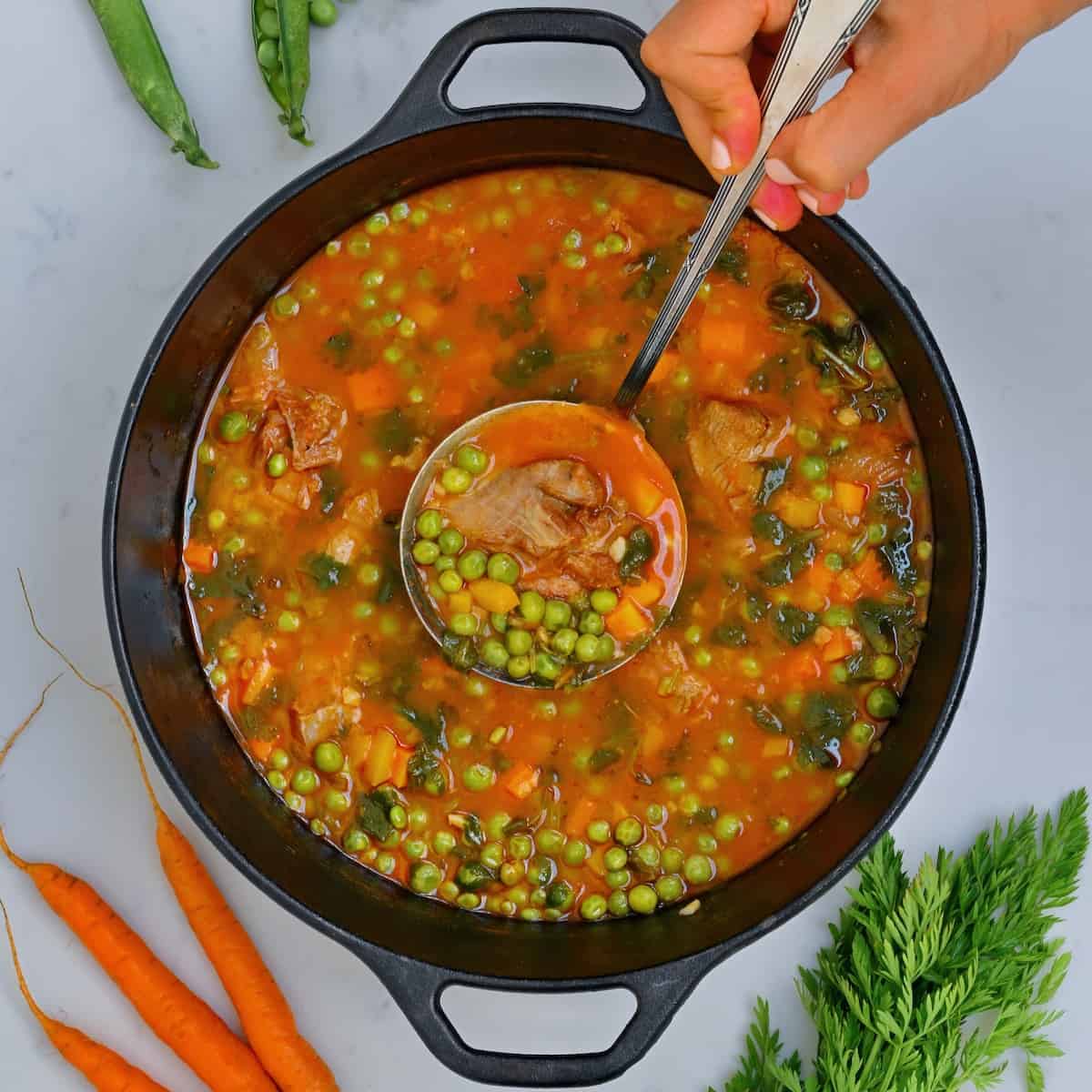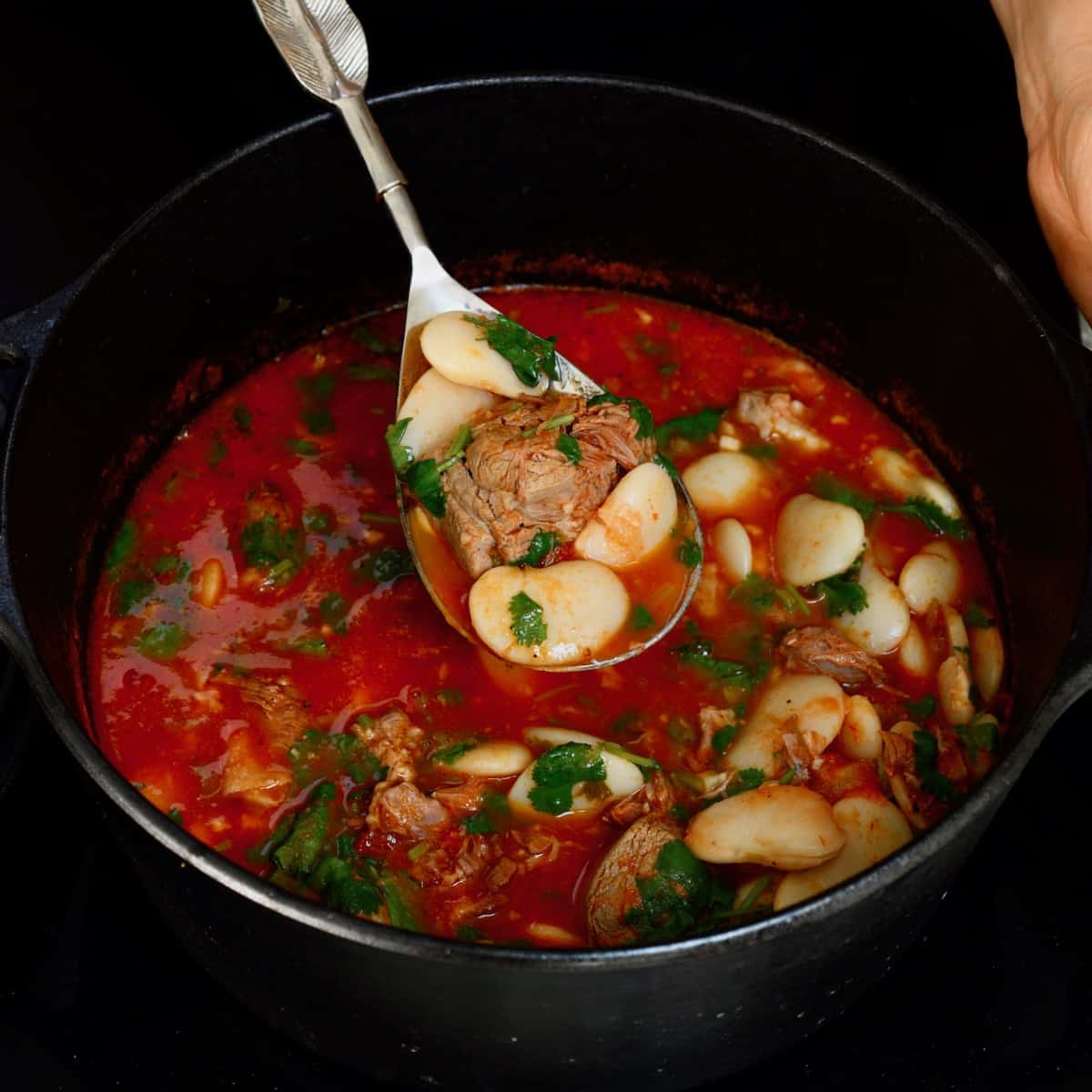What is Bamia?
Like fasolia and bazella, bamia (bamya) is a stew named after its main ingredient – okra. Bamia is the Arabic word for okra and refers to a simple tomato and okra stew (often with lamb or beef) popular in the Middle East, Greece, Egypt, and Turkey. This simple bamya (stewed okra) combines okra and lamb (optional!) in a tomato-based sauce with onion, garlic, and cilantro. For this bamia recipe, I’ve included both meaty (with beef or lamb) and meat-free options, no matter who you’re serving. Either way, the results are delicious! Especially when served up with buttery vermicelli rice and pita flatbread. Not only is this bamia recipe easy to make, but it requires just 8 ingredients (plus salt and pepper) and takes under an hour to prepare! The results are comforting and yet light enough as a summer or winter stew (similar to this Lebanese Green Beans or eggplant stew). This is a dish I didn’t immediately love as a child, thanks to the potential “sliminess” of okra. However, as an adult, I’ve learned how to properly use this ingredient, and – wow – it’s delicious! Okra has a natural “mucilage” (similar to aloe vera), which can cause certain dishes to become “slimy.” However, in the case of stews, it can work to your benefit, as it naturally thickens the stew. In any case, I’ve included notes on how to minimize this (read the Recipe Notes section below!).
Health Benefits of Okra
Okra is also referred to as ladies fingers, bamia, bamya, okro, and ochro – all refer to the same ingredients, part of the mallow family, and popular in Asian and Mediterranean cuisine. When it comes to health benefits, okra is particularly rich in vitamins A and C (which is great for immune health) as well as vitamin K, B, calcium, folic acid, and potassium. More so, okra is packed with dietary fiber and is said to help improve heart health by reducing harmful cholesterol levels. You can read more about the health benefits of okra if interested. For now, though, let’s jump into the bamia recipe. However, if you want more Lebanese recipe inspiration, you may also like this pea and carrot stew, za’atar manakish, falafel wrap, and this stuffed makdous (cured eggplant)!
The Bamia Ingredients
Tomatoes: you can use fresh tomatoes, carton tomato juice/passata, or even tinned crushed tomatoes. You’ll also need tomato paste (I use homemade). Okra: you can use fresh, frozen (and thawed), or dried (then rehydrated) okra. I recommend using young okra for this bamia/baya (small pods). Avoid fresh okra out of season as it can be very tough and won’t tenderize well in the stew. Meat: you’ll need cooked lamb or beef shank with beef stock for the meaty version (traditional) of this bamia recipe. Keep reading below for the vegetarian/vegan option. Garlic: adjust the amount to personal taste. Olive oil: I recommend using a light extra virgin olive oil. Spices: you’ll need ground coriander seeds and salt and pepper. Lemon juice: use fresh lemon juice for the best and freshest results. Lime would also work. Cilantro: you can use fresh or frozen cilantro (no need to “thaw”). Alternatively, you could use parsley, though it obviously won’t taste exactly the same. Vermicelli rice (optional): you can serve the vermicelli rice alongside the stewed okra. Alternatively, regular white rice, brown rice, or quinoa would work.
Optional Add-ins and Variations
Vegan/Vegetarian okra stew: simply omit the beef and use vegetable stock for the simplest vegetarian okra stew. I also recommend adding an onion to the stewed okra recipe for extra flavor. Cumin: while not traditional in my family’s version, cumin (around 1 tsp) is a popular addition to bamya recipes. Turmeric: around 1/2 tsp turmeric powder will add dimension to the flavor. Paprika: for a slightly smokey flavor, I recommend adding around 1 tsp smoked paprika. Spice: if you prefer a spicy Lebanese okra stew, feel free to add a finely chopped chili or some chili/cayenne powder. Adjust the amount to personal taste. Pomegranate molasses: This might sound odd, but is a popular addition to bamia/bamya. I recommend adding 1 tsp pomegranate molasses at the same time as the tomatoes. Lebanese 7 spice/allspice: I recommend around 1 tsp to the stewed okra.
How to Make Lebanese Bamia (Okra Stew)?
Step 1: The Pre-prep
You’ll first need to prepare the beef (if using). You could also cook the vermicelli rice or rice of your choice in advance (or cook it while preparing the bamia).
Step 2: Prepare the Okra
If you’re using dried okra, first rehydrate it with water and vinegar for 2 hours (you’ll need 3 cups hot water per 1 cup dried okra. I use 2 ½ cups water and ½ cup vinegar – which is meant to help reduce sliminess when the okra s cooked). For fresh okra, wash and dry it well. Then slice off the stems. In a large pan, add around 2-inches of oil (or use a deep-fryer, if you have one) and heat up. Once hot enough (you can test this by placing a wooden skewer in the oil – if it starts to bubble around the stick, the oil is ready), then fry the okra in the hot oil for several minutes until lightly browned. The easiest way to do this is to place the okra in a sieve to lower up and down from the hot oil. The okra is traditionally fried first to not become ‘viscous’ when added to the stew. Once cooked, transfer the okra to a layer of paper towels to absorb any excess oil.
Step 3: Prepare the Remaining Ingredients
Then, separate the cilantro leaves from the stems and finely chop the stems. You can transfer the leaves back to the fridge for now (these will be used at the end). Then, slice the garlic and, if you’re using fresh tomatoes, chop roughly and add them to a blender to process into a thick “juice.”
Step 4: Sauté the ngredients
Heat two tablespoons of olive oil in a large, deep pot (or Dutch oven). Then add the garlic and sauté over medium-low heat for 30-40 seconds. Then add the tomato paste, stir, and sauté for a further two minutes. Next, add the tomato “juice” (or passata/crushed tomatoes), cilantro stems, and ground coriander seeds, and allow the mixture to simmer for 10-15 minutes to reduce and thicken.
Step 5: Add the Meat
After reducing, add the cooked beef (or lamb) and stock to the stew, reduce the heat to low, and then allow it to simmer for 20 minutes, stirring occasionally. For the vegetarian version, omit the meat and use vegetable stock.
Step 6: Add the Okra
Add the okra to the pan and stir, cooking for 2-3 minutes. Then add the salt and pepper (to taste), stir, and cook for a further minute or two. Finally, add the cilantro leaves and lemon juice into the stew, mixing and removing the pan from the heat. Serve the bamia immediately with the prepared vermicelli rice or the sides of your choice and some lemon wedges.
How to Serve?
Traditionally, you can enjoy this bamia (okra stew) alongside rice: vermicelli rice, brown rice, basmati, or white rice will all work. Quinoa would also pair well. You could additionally serve it alongside a simple leafy green salad and/or pita bread or a similar flatbread (like Ramadan pide) for mopping up the stew sauce. For non-traditional serving options, enjoy this bamya with mashed or baked potatoes.
How to Store?
Store: allow the bamia to cool, then store in an airtight container in the fridge for up to 5 days. Freeze: store the cooled Lebanese okra stew in an airtight container/s for up to 3 months. Allow it to thaw overnight in the fridge before reheating. Just note that the okra will soften slightly upon thawing. Reheat: you can reheat the bamia/ bamya on the stovetop or in the microwave until heated through. Add an extra splash of water (or stock) to bring it back to its’ saucy consistency, if needed.
Use a heavy–bottomed pan: or Dutch Oven. These distribute heat more evenly. That way, you’re less likely to get “hot spots” and burn the bamya stew while simmering. How to avoid slimy okra? The main steps we take to prevent slimy cooked okra is by frying it first and keeping the okra whole. However, if you’re using larger sliced okra or skip the frying step, there are other ways to reduce the sliminess. For example, soaking the okra in vinegar for 30 minutes pre-cooking should help. As will pre-cooking the okra in other ways, such as sauteing, roasting, or blanching in boiling water. Other top tips to reduce okra sliminess: don’t cook the bamia covered at all (as the steam will cause sliminess) and try to keep the majority of “salting” of the dish to the end – as salt draws out excess liquid from the okra – hence sliminess. Enjoying okra stew for months: as okra is only in season during the summer months, it’s a good idea to buy it in bulk and store it in the freezer for the winter months. When stored in an airtight container, the okra will stay fresh for 6+ months. Bamia ages well: I actually think this okra stew tastes even better on the second day. Cook the okra to your preferred tenderness: if you like it really tender, feel free to increase the cooking time. Just be aware that the longer they cook, the higher chance of more sliminess. Do I need to pre-fry the okra? This is a step I do to reduce the risk of okra sliminess. However, it’s not 100% necessary – especially when keeping the okra whole and following the other steps above. There’s no need to thaw frozen okra if you’re adding the okra directly to the stew pan! What does okra taste like? Okra has a fairly mild taste- some say similar to eggplant and a little like zucchini. However, it’s relatively unique – give it a try and let me know what you think!
More Hearty Recipes
Easy Slow Cooker Beef Stew Recipe Carrot and Pea Stew (Bazella w Riz Recipe) Butter Bean Stew (Fasolia Recipe) Lebanese Green Beans (Loubieh Bi Zeit) Lebanese Molokhia with Chicken
If you try this Lebanese bamia recipe, I’d love to hear your thoughts/questions below. Also, I’d appreciate a recipe card rating below, and feel free to tag me in your recipe recreations on Instagram @Alphafoodie!
